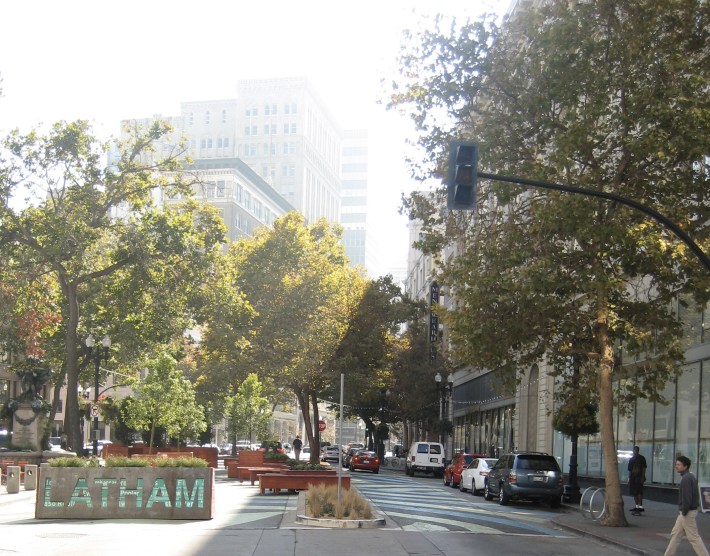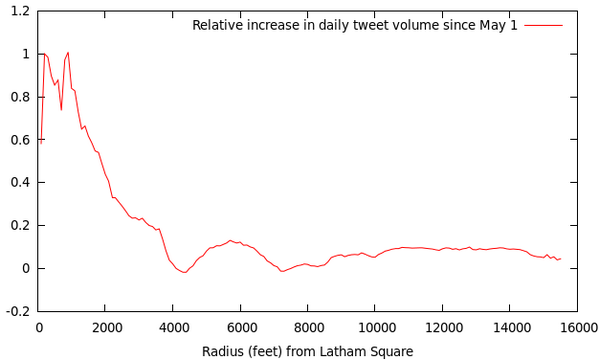
After public pressure, the City of Oakland held a second community meeting Wednesday about the design of the Latham Square pilot plaza, where a lane of car traffic was reinstated prematurely at the behest of Planning and Building Director Rachel Flynn. Despite a standing room-only crowd of attendees showing up to weigh in, the meeting was shut down 45 minutes early.
For city officials, the proposal to widen sidewalks but permanently reinstate two-way car traffic at Latham Square appears to be a done deal -- though no pedestrian usage data was presented to the public after a six-week car-free pilot period.
"I don’t see us going back to the closure" of Telegraph, said Brooke Levin, interim director of the Oakland Public Works Agency. In fact, she added, it is likely the city will reopen the northbound traffic before construction begins on the final design next summer.
Before Wednesday's public meeting, city staffers held an invitation-only meeting on November 15 with City Manager Deana Santana. Invitees included several business owners who oppose the car-free plaza, along with representatives of the Downtown Oakland Association (which supports the pedestrian plaza), Popuphood, Walk Oakland Bike Oakland, and Oakland’s Bicycle and Pedestrian Advisory Committee.
But attendees who packed the public meeting, which was not announced on the city's website until the day before, appeared evenly divided between supporters of the car-free plaza and those who want to bring back two-way car traffic. "We’re not going to satisfy everybody," Levin told the crowd.
City planners' recommended permanent design for the plaza includes restoration of two-way traffic on Telegraph with narrower auto lanes and an expansion of the existing sidewalk in the triangle between Broadway and Telegraph. Opinions and suggestions for the design were mixed among the 50-plus Oakland residents, merchants, property owners, and downtown workers at the meeting.

Even though City of Oakland spokesperson Karen Boyd said "the input from this public meeting will inform and guide the staff recommendation to be presented to the City Council," it appears it's already been decided that the recommended design will include a plaza with cars cutting through.
Many speakers questioned the city's lack of data and analysis on pedestrian usage at Latham Square so far during the pilot period. As one indicator of its popularity, a chart tweeted by Eric Fisher shows that the volume of tweets sent out at or close to Latham Square has roughly doubled since May.

One man at the meeting, who said he's had an office near the plaza site for 15 years, said he never used it until the car-free pilot was implemented, and lamented the proposal for what he called a return to "Latham sliver."
Among the swirl of different suggestions from attendees, one popular idea was to convert 17th Street to a two-way street, solving the circulation problems for car traffic that city planners cited in the city’s traffic study. Speakers also suggested creating a more flexible space -- city planners said their proposed design would allow traffic lanes to easily be closed to cars, but several attendees suggested a curb-less street design, in which cars are allowed, but drivers are expected give priority to pedestrians. Levin dismissed that idea, citing city regulations that require streets to have curbs to facilitate street cleaning.
About halfway through the planned two-hour meeting, Levin stepped forward to field questions and offer information, then limited comments and moved to shut the meeting down. When someone objected, pointing out that people were still arriving and it was improper to close a public meeting before the scheduled time, she appeared confused and asked if anyone else wanted to comment, but the meeting had already begun to break up.
Levin stressed that there will be a public input session on the design details after the City Council approves the final design in January. People who provided their emails will be notified of the January meeting, but it’s not clear if the meeting will be announced to the general public. When asked how to submit additional comments, city staffers admitted that the city’s Latham Square web page was out of date. Since the meeting, the page has been updated and the online comment link is working.
The fate of Latham Square now rests with the Oakland City Council. The public can send email comments to members of the City Council members.





